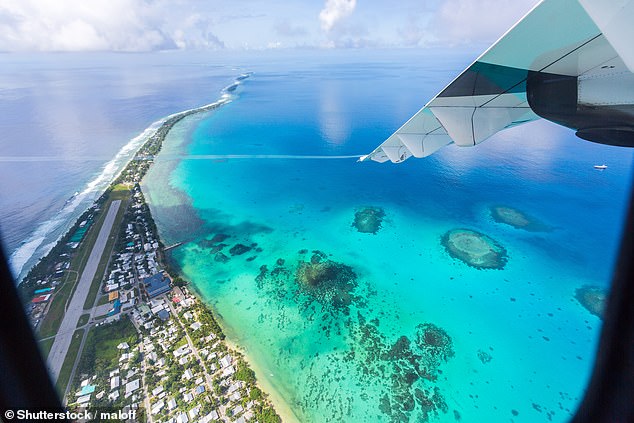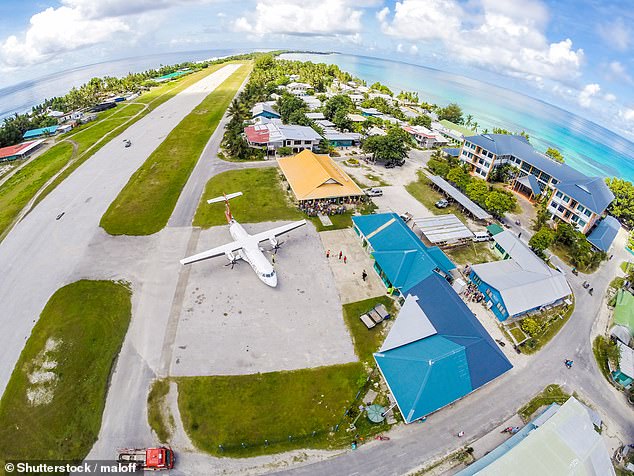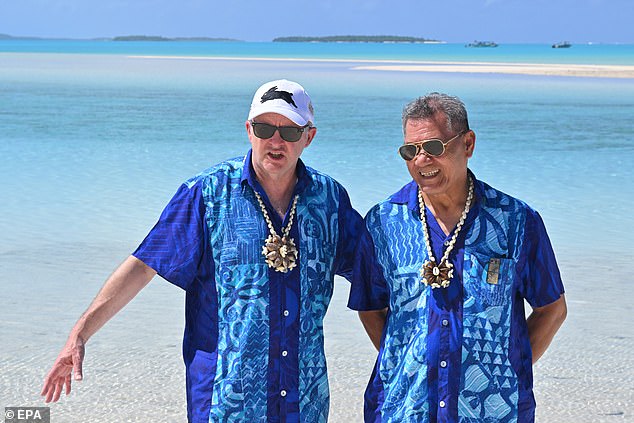Dreaming about decamping to a far-flung island where the world’s troubles feel a million miles away?
Then you could always make for a speck of an island in the Pacific Ocean that manages to exist peacefully without a prison or an army.
The downside? It could also be the first country in the world to disappear due to rising sea levels.
Located 1,000km north of Fiji in the west-central Pacific Ocean just below the equator, the remote country of Tuvalu isn’t the easiest of places to get to – but it does manage to have a society that relies on community values over overbearing official authority.
Given it’s a remote, hard-to-reach location, the United Nations World Tourism Organization named Tuvalu as the world’s least-visited country for 2023 with around just 3,700 tourists landing on its shores per year.
In terms of area, the archipelago – which consists of four reef islands and five coral atolls – measures about 10 square miles, making it the fourth smallest country in the world and 0.8 times the size of Manhattan.
As for its population, there are around 10,000 inhabitants.
Getting there won’t be easy – there are no direct international flights to Tuvalu, and there are only three flights a week running from the island chain to and from Fiji.

Paradise soon to be lost? Tuvalu is located 1,000km north of Fiji in the west-central Pacific Ocean… but could disappear within 50 years because of global warming, say experts

The United Nations World Tourism Organization named Tuvalu as the world’s least-visited country in 2023
As it requires plenty of time and money to get to Tuvalu, it tends to attract the more adventurous tourist and some have shared their insights of the place on social media.
One TikToker who visited the capital of Funafuti last year said of the island: ‘It’s definitely very peaceful, everything feels like one family – every one knows one another.’
last year said of the island: ‘It’s definitely very peaceful, everything feels like one family – every one knows one another.’
On a more sombre note, many of those who’ve visited highlight Tuvalu’s environmental plight – it’s predicted that the country could be off the global map in just 50 years due to climate change and rising sea levels.
In 2022, Tuvalu’s Foreign Minister Simon Kofe gave a speech to the United Nations COP26 climate summit while standing knee-deep in water where there was once land.
As the country’s highest point is four metres above sea level, any rise in the sea level means parts of some islands will be washed away, while other parts will become uninhabitable.
In 2023, Australia offered the residents of the tiny island nation the chance to live, work and study there.
In an announcement on the sidelines of the Pacific Islands Forum in the Cooks Islands, PM Anthony Albanese said Australia would strike a treaty with Tuvalu.
Under the pact, Australia will also provide assistance to the Pacific Island in cases of natural disasters, pandemics and threats to its national security.

Tuvalu’s capital is Funafuti; the atoll was the world’s least-visited country in 2023

In 2023, Australia’s Prime Minister Anthony Albanese, left, pictured with Tuvalu’s then-PM Kausea Natano, agreed a pact that would allow people from the Pacific island to work, study and live in Australia – but he’s since been criticised by Tuvalu’s politicians over fossil fuel emissions
However, in October 2024, Tuvalu’s latest Prime Minister Feleti Teo released a report that called out Australia, Canada and the UK for disproportionately high emissions from fossil fuel extraction within the Commonwealth of Nations, compared to their share of population.
‘Despite rhetoric on climate leadership and Pacific solidarity, Australia’s fossil fuel exports are second only to Russia, with… the largest pipeline of coal export projects in the world awaiting approval,’ a statement from the report authors, the Fossil Fuel Non-Proliferation Treaty Initiative, said.
The report said that as wealthier nations benefited the most from coal and gas, they could therefore more easily absorb reductions in fossil fuel production.
‘It is a death sentence for us if larger nations continue to open new fossil fuel projects,’ Tuvalu Home Affairs Minister Maina Vakafua Talia said.
‘As a Commonwealth family, we must work together to keep our Paris commitments of limiting warming to 1.5 degrees alive and lead in financing a fair transition for countries like ours.
Tuvalu’s prime minister said Australia was ‘highly morally obliged’ to take further action to reduce emissions and phase out fossil fuels.











